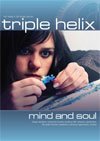Pablo Martinez on anxiety and faith in Jesus Christ
As the deer pants for streams for water, so my soul pants for you, O God. My soul thirsts for God, for the living God' (1)
Anxiety is one of the most common medical conditions today affecting about 20% of the population. Almost half of the patients seen by a family doctor have some kind of anxiety related disorder. Many symptoms are caused by anxiety: headaches, lack of breath, dizziness, muscle pains, sexual and gynaecological dysfunctions, etc. One of the most neglected causes of anxiety is the lack of meaning and purpose in life. This is what we call existential anxiety.
Certain schools of psychotherapy, the so-called existential schools, maintain that man's central problem lies in his lack of meaning in life. Authors such as Victor Frankl (2) and Binswanger identify a person's basic problem as the absence of vital meaning with its inevitable results: desperation, the sense of cosmic disorientation, the nausea of which Sartre speaks. (3) This disturbing inner unrest goes far beyond the symptoms of clinical anxiety (panic attacks, free floating anxiety, phobias etc). What is the origin of such a deep rooted condition that is not relieved by anti-anxiety drugs nor by psychotherapy? According to existential therapists, the solution lies in finding significant and enriching relationships. The therapeutic key is to be found in encounters with others: a genuine relationship is the main healing instrument.
This viewpoint partially coincides with the biblical diagnosis of human nature. God created humans with their greatest need being the need for relationship. 'It is not good for the man to be alone. I will make a helper suitable for him.', (4) said God. This ought not to surprise us since humans were made in the image and likeness of their creator who, from eternity, enjoys a harmonious and intimate relationship among the persons of the Trinity. This helps us understand that human beings are born with that profound need of having contact with a 'you'.
Nevertheless many people seem to have satisfactory relationships, and yet they do not have peace, that inner harmony or shalom. Why? These relationships need to be two-dimensional: with our fellow human beings, but also with our creator. Such was man's original situation indeed the most vital relationship is the relationship with our creator. In Genesis 1 and 2, human beings did not have emotional problems: there was no fear, no shame, no pain, because there was a perfect relationship between God and man, and that gave total fulfilment. But, as soon as man drifts away from God, this harmony is broken and conflicts arise both within himself, fear and shame occur for the first time, (5) as well as with his neighbour: 'Cain attacked his brother Abel and killed him.' (6) Separation from God is therefore the ultimate source of anxiety because our deepest need is not being met. Jung himself, said: 'I have never seen a single case of neurosis that ultimately did not have an existential origin.'
Existential anxiety is sometimes terrible to experience. Jesus' words on the cross: 'My God, my God, why have you forsaken me?' (7) remind us of the intense pain of this reality. How right was the Spanish mystic author St John of the Cross, when he wrote about 'the dark night of the soul without God'. (8) Being away from God is probably the most disturbing experience any human being can ever face. This is Hell – banishment from relationship with God. Seen in this light, Christian faith becomes the antidote that reaches the deepest cause of anxiety. Ultimately the problem of anxiety requires a firm hope, a hope that is not Utopia, but based on the person and work of our Lord Jesus Christ. It is a hope that provides certainty and meaning to our existence - both present and future - because it does not arise primarily from subjective feelings, 'a religious experience,' but from objective facts. Whenever the apostle Paul refers to God´s promises and to future life, he uses the verb 'we know'; he does not say we imagine or we feel. (9) A solid hope, described as 'an anchor for the soul...firm and secure' (10) is a soothing balm to our deep restlessness and anxiety.
The Christian faith also relieves existential anxiety through the therapeutic tools of prayer and Bible meditation. Inasmuch as they provide us with personal contact with God, they return us to the first relationship (with the obvious limitations imposed upon us by our fallen nature) and enable us to rediscover the true purpose of life: relationship with God. As they restore free and constant dialogue with our creator, prayer and meditation allow us to meet our deepest longing, our thirst for God. They contain the most therapeutic element to relieve existential anxiety for which there is no substitute.
As a practising psychiatrist I am convinced that the Christian message provides the supreme antidote against existential anxiety because Christ alone, the image of the invisible God, is the only one fully able to fill that 'God shaped void that only God can fill.' (11)
Pablo Martinez is a psychiatrist, author and Bible teacher.
































